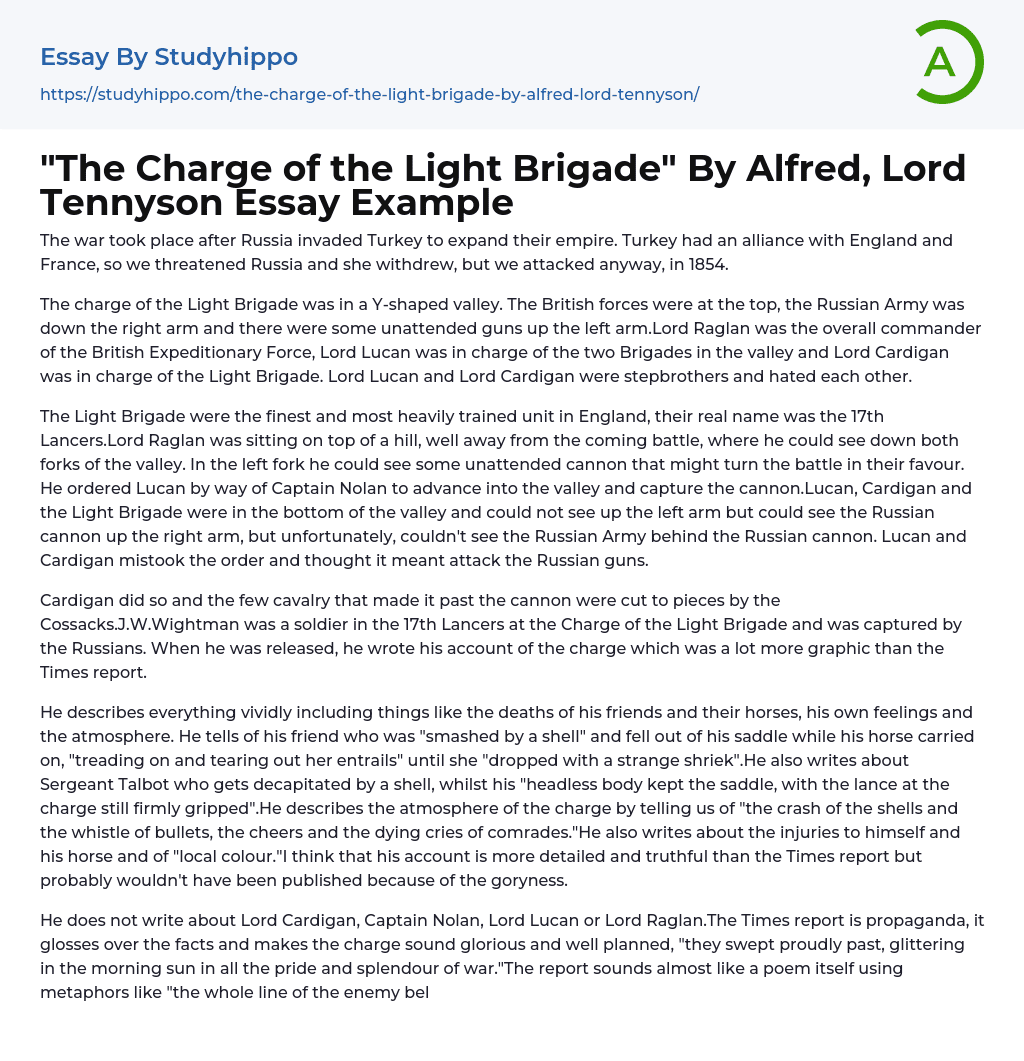

“The Charge of the Light Brigade” By Alfred, Lord Tennyson Essay Example
In 1854, Russia invaded Turkey to expand their empire, despite Turkey's alliance with England and France. After being threatened by us, Russia withdrew but we still launched an attack.
Located in a Y-shaped valley, the charge of the Light Brigade saw the British forces stationed at the top, the Russian Army situated down the right arm and some unattended guns placed up the left arm. Leading the British Expeditionary Force was Lord Raglan, while overseeing the two Brigades in the valley was Lord Lucan, and the Light Brigade was under the command of Lord Cardigan. Interestingly enough, Lord Lucan and Lord Cardigan were stepbrothers who harbored a deep-seated hatred for each other.
The 17th Lancers, also known as the Light Brigade, were England's elite and highly trained unit. Lord Raglan positioned himself atop a hill a
...way from the upcoming battle to gain a strategic view down both forks of the valley. He spotted some unattended cannon in the left fork that could sway the battle in their favor and ordered Lucan through Captain Nolan to seize them. Unfortunately, Lucan, Cardigan and the Light Brigade were at the valley's bottom and unable to see up the left arm, but were able to spot the Russian cannon up the right arm. However, they were unaware of the Russian Army behind them. Lucan and Cardigan misinterpreted the order, believing it meant they should assault the Russian guns.
Cardigan carried out his orders during the Charge of the Light Brigade, resulting in a few cavalry members breaking through the cannon line. Nevertheless, they were swiftly defeated by the Cossacks. J.W. Wightman from the 17th Lancers was one of those soldiers and got
captured by Russians but later released. His personal account of this event vividly describes what happened beyond what was reported in the Times.
In his account, he vividly portrays everything including the deaths of his friends and their horses, his own emotions, and the atmosphere. He recounts how his friend was "smashed by a shell" and ejected from his saddle while his horse kept going, "stepping on and tearing her insides" until she "collapsed with a peculiar scream." Additionally, he explains Sergeant Talbot's decapitation due to a shell while noting that his "headless body remained in the saddle with the lance still securely clutched." By detailing "the roar of the shells and bullets, the cheers, and cries of dying comrades," he describes the charge's atmosphere. He also mentions both his and his horse's injuries, as well as "local color." While it is probable that his report would not have been published due to its gruesome nature, it is more comprehensive and factual than the Times article.
In his writing, he neglects to mention certain individuals including Lord Cardigan, Captain Nolan, Lord Lucan, and Lord Raglan. The report in The Times is not entirely accurate and can be considered propaganda since it downplays the actual events and portrays them as glorious and well-planned. The report contains poetic language with metaphors such as "a halo of steel above their heads" and "the whole line of the enemy belched forth from thirty iron mouths". However, it provides specific details such as the start and end times of the charge and the distance between the cavalry and the cannons during the attack.
The significance of the Times report lies in its
ability to uplift British morale and shield them from the stark realities of war. If people were fully aware of the extent of horror, public support for the war would diminish and questions would arise about the government's motivation for putting soldiers at risk. The media glorifies war by focusing solely on bravery and valour while ignoring irresponsible leadership resulting in unnecessary death. Providing truthful accounts of war, as suggested by Wightman, could lead to better strategic planning and victory with fewer casualties. It would also force Lords to plan strategically instead of relying on their own self-importance and vanity to win battles while sparing the public from learning about army tactics that use soldiers as mere cannon fodder.
- Air Force essays
- Army essays
- Soldiers essays
- Army Values essays
- United States Army essays
- Veteran essays
- Aircraft essays
- Sergeant essays
- World War I essays
- World War Ii essays
- Atomic Bomb essays
- American Civil War essays
- Attack essays
- Cold War essays
- Crimean War essays
- Emilio Aguinaldo essays
- Iraq War essays
- Korean War essays
- Nazism essays
- Nuclear Weapon essays
- Philippine Revolution essays
- Trench Warfare essays
- Vietnam War essays
- Western Front essays
- Diplomacy essays
- Emperor essays
- Rwanda essays
- Tribe essays
- Revolutionary War essays
- War of 1812 essays
- Mexican American War essays
- Hitler essays
- The Spanish American War essays
- League Of Nations essays
- Battle Of The Somme essays
- Treaty Of Versailles essays
- Fascism essays
- D-day essays
- Atomic Physics essays
- Atomic Bombings Of Hiroshima And Nagasaki essays
- Electron essays
- Atom essays
- Big Bang Theory essays
- Density essays
- Electricity essays
- Energy essays
- Force essays
- Heat essays
- Light essays
- Motion essays



